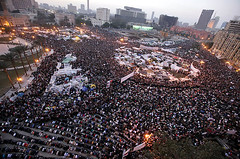
The largest mass mobilization at Tahrir Square in Cairo, Egypt on Feb. 8, 2011. The Egyptian people have continued their struggle for the removal of Hosni Mubarak and his government.
Originally uploaded by Pan-African News Wire File Photos
(UKPA)
Egypt's military rulers have taken sweeping action to dismantle the autocratic legacy of former president Hosni Mubarak.
They dissolved parliament, suspended the constitution and promised elections in moves cautiously welcomed by pro-democracy protesters.
The caretaker government, backed by the army, said restoring security after the 18-day uprising that ousted Mr Mubarak was a top priority even as labour unrest reflected one of the many challenges of steering the Arab world's biggest nation towards stability and democracy.
Egypt's upheaval was also splintering into a host of smaller grievances, the inevitable outcome of emboldened citizens feeling free to speak up, most of them for the first time.
They even included about 2,000 police, widely hated for brutality and corruption under Mr Mubarak, who marched to the Interior Ministry to demand better pay and conditions. They passed through the protest camp at Tahrir Square, where demonstrators hurled insults at them, calling them "pigs" and "dogs".
Dozens of employees protested against alleged corruption at the state television building, which broadcast pro-Mubarak messages during the massive demonstrations against his rule.
The caretaker government met for the first time, and employees removed a huge picture of Mr Mubarak in the meeting room before they convened.
The crowds in the protest encampment that became a symbol of defiance against the government thinned out on Sunday - the first working day since the regime fell. Traffic flowed through the central crossroads for the first time in weeks and troops cleared most of the makeshift tents and scuffled with activists still holding out.
The protesters have been pressing the ruling military council, led by defence minister Hussein Tantawi, to immediately move forward with the transition by appointing a presidential council, dissolving parliament and releasing political prisoners.
Thousands have remained in Tahrir Square and some want to keep up the pressure for immediate steps by the council such as the repeal of repressive emergency laws that give police broad power.
Copyright © 2011 The Press Association. All rights reserved.
No comments:
Post a Comment